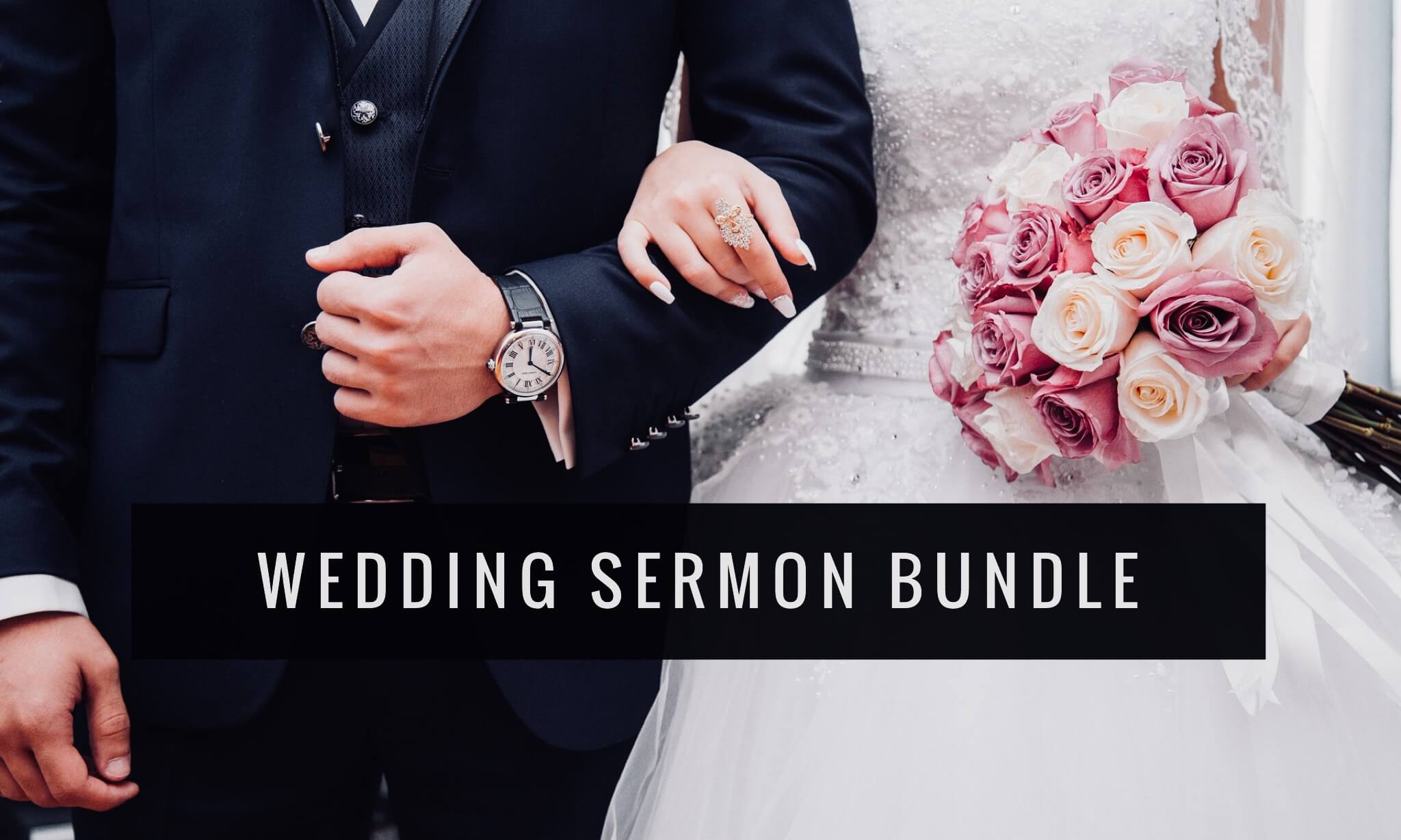How to Perform a Wedding: the Complete Guide
“Will you perform our wedding?”
Few questions bring a greater sense of honor and anxiety wrapped into one.
As a pastor for ten years, I’ve performed my share of weddings, and I still get a bit nervous. So if you’ve never done it before, it’s incredibly intimidating.
So how do you perform a wedding?
Here’s a rundown of everything I’ve learned.
Legal Requirements
First, make sure that you are legally able to perform the wedding. If not, the marriage might be valid in God’s eyes, but it won’t be according to the government.
Requirements vary from state to state, so check with your local court for specific requirements.
Typically you must be either licensed or ordained to perform a wedding, but some states have additional requirements.
Second, the wedding will not be legal unless the bride and groom get a marriage license from their local court. After the wedding, the bride, groom, wedding officiant (that’s you), and two witnesses (typically the maid of honor and the best man) sign the license.
Finally, the signed license is returned to the court where it the marriage officially becomes legally binding.
Meeting with the Bride and Groom
Before agreeing to perform the wedding, schedule an introductory meeting with the bride and groom.
Here are some things you should cover in your first meeting.
1. Ask About Their Relationship
Begin with some basic questions about their relationship to get to know them better.
How did you meet? What do you like doing together?
How did you propose? What are you doing for your honeymoon?
What do you value most in your relationship? What do you appreciate the most about him/her?
2. Lock in the Date
What will be the date, time, and location of the wedding?
When will the rehearsal be?
Check your calendar to make sure it all works with your schedule write it down somewhere so you won’t forget.
3. Lay Out The Order of Ceremony
It’s helpful to have a Wedding Planning Sheet for yourself and a copy to hand out to the couple, so they get a clear understanding of their options.
You can get my Wedding Planning Sheet here if you want.
Simply walk them through each element and have them select what they want or don’t want. See an example with more details in the next section.
4. Talk About the Reception
If I have a great relationship with the couple, I’ll try to stay for the reception.
However, if you know that you have a busy weekend, politely let the couple know that you won’t be able to stay for the reception or that you’ll only be there for a little while.
Set this expectation up front, so they don’t expect you to stay if you can’t.
Plus, you don’t want them to assume you are staying and pay for your meal. You’ll save them money by letting them know you cannot attend.
Often, I’ll just explain that I do a lot of weddings and the receptions run for hours that take me away from my family and I simply cannot stay for all of them, or that I have other commitments early the next day.
4. Talk About the Marriage License
It’s the bride and groom’s responsibility to get a marriage license from the state. Make sure they know that they need to get one as soon as possible and have it ready by the day of the wedding.
After the wedding, before they do anything else, you must meet with them to sign the license along with two witnesses.
Some pastors will take the license and turn it in for the couple, but that is way more responsibility than I want.
I usually suggest that they assign this responsibility to someone they trust or do it themselves.
5. Schedule Premarital Counseling
Will you do premarital counseling sessions with the couple?
If so, agree in your first meeting how many sessions you will you meet for, and when you will you meet.
Schedule it all upfront.
6. Agree on Payment
If you charge for officiating a wedding, which I think you should since you are working and taking time away from your family, you need to agree on the payment amount and when the payment is due.
For example, if you decide to charge $100 to perform their wedding, make sure they know that you will need the $100 a week before the wedding.
Decide what you think is best. It’s not unusual to charge between $100-300 for a wedding.
If you struggle with taking money to perform a wedding, think about the number of hours it requires of you.
First, you have the meeting with the couple which may run for an hour. Then, if you do premarital counseling, you may meet three or four times for another hour each time. Next, you’ll spend time preparing and practicing the ceremony. And if there’s a rehearsal ceremony, you’ll spend an hour or two there. Plus, you’ll spend at least two hours at the wedding.
So in total, you could easily spend 10 or more hours on one wedding.
You deserve to be compensated for your time just as much or more than the photographer, wedding coordinator, caterer, DJ, and all the other professionals that charge for their services in exchange for the value they provide.
7. Pray With Them
It’s easy to get caught up in the practical side of scheduling and planning the wedding and neglect the spiritual side.
Don’t forget to bring God into every step of the process.
Planning The Wedding Ceremony
Although it can vary, most wedding ceremonies follow a standard order: procession, welcome, declaration of intent, giving the bride away, sermon, vows, ring exchange, optional added elements, pronouncement, kiss, recessional, and closing comments.
1. Procession
Music plays. The pastor, groom, and groomsmen enter. The bridal party, ring bearer, and flower girl enter. Then, all stand (traditionally led by the mother of the bride standing first) and the bride is escorted down the aisle (usually by her father).
2. Welcome
“Dearly beloved we are gathered here today…”
The pastor greets everyone, explains the reason for the gathering, often stating the purpose of marriage, and then prays for God to bless the marriage.
3. Declaration of intent
“Do you take this man to be your husband…?”
The bride and groom say “I do” to declare their intention to be married.
4. Giving bride away
“Who gives this woman to be married to this man?”
Traditionally, the father of the bride responds to grant his approval to the marriage.
Often at this time, the pastor will also ask people to speak now if they have any reason to object to the marriage.
But instead of a tense moment where everyone holds their breath hoping no one speaks up, I like to include a response of family and friends to agree to support the couple in their marriage.
5. Sermon
The pastor reads a passage of Scripture and delivers a brief message directed towards the bride and groom.
I will also use this time to explain the gospel and how it applies to marriage briefly.
This helps the bride and groom understand how their faith connects to their marriage and also presents an opportunity to share the gospel with those in the audience who may have never heard it before.
6. Vow Exchange
There are two options here: traditional or written vows.
For traditional vows, the bride and groom simply repeat after the pastor pledging their love for one another till death do they part.
If the couple chooses to write their own vows, I encourage them to write them down and read from their notes.
Yes, memorizing and sharing from your heart might be beautiful, but often the bride and groom are so nervous that they’ll forget. Having a piece of paper or a note card that they can read will help them as they fight back the tears or struggle to calm their nerves.
7. Ring Exchange
“May I have the rings, please.”
Typically the best man hands the rings to the pastor. The pastor explains the symbolism of the rings, then the bride and groom place the rings on each other’s fingers.
8. Additional Elements
There a lot of different options that people sometimes like to include in their weddings today.
For example, they may want to take communion, light a unity candle, do a sand ceremony, or have a special musical performance.
This part of the ceremony is where many of those options fit best.
So ask if there any additional elements like these that they want to do as part of the wedding ceremony.
9. Pronouncement
“I now pronounce you as husband and wife.”
10. Kiss
“You may now kiss the bride!”
11. Recessional
“Ladies and gentlemen, may I be the first to present to you…”
The bride and groom exit first, followed by the wedding party.
12. Closing comments.
After the wedding party has exited, close by thanking everyone for coming, invite them to the reception, and provide any necessary details or instructions.
Rehearsal
At the rehearsal, you’ll just walk through everything people need to know for the ceremony.
It should be pretty relaxed, but here are a few tips to help.
1. Arrive early
Set everyone at ease knowing that you are a person who arrives on time.
If you’re late for the rehearsal, they’ll worry that you’ll be late for the wedding too.
2. Know who’s in charge
Often there is a wedding coordinator at the venue to make sure everyone knows where to go and what to do. Sometimes this is a family friend or someone you’ve scheduled to help at your church.
But if there is not a coordinator, congratulations, everyone will be looking at you to tell them where to go and what to do.
3. Know when and where to enter
Go through the order of who enters when and from where.
Make everyone practices walking down the aisle and standing at the alter a few times.
4. Smile
People will begin to get nervous during the rehearsal, so have fun, smile, be lighthearted, and help put everyone at ease.
The rehearsal can be fun if you allow a little laughter to break up the awkwardness.
5. Hit the highlights
Don’t perform the entire ceremony at the rehearsal word-for-word.
Just cover the highlights and parts where others are involved: the processional, how the bride will be given away, how the bride and groom will stand at the altar, how the best man (or whoever has the rings) will hand them to you, how the bride and groom will place them on one another’s fingers, when they say their vows, the kiss, and how they will exit on the final pronouncement.
I always tell the wedding party that if the rings are dropped for any reason, only the person holding it should pick them up. You don’t want everyone diving on them like a grenade.
Also, I always remind the party not to lock their knees.
We’ve all seen the videos of people passing out at weddings. Locking your knees when you’re nervous is what often causes that.
6. Know how to close
Make sure you have all the details of where to direct the guests immediately after the ceremony.
Is the reception at the same venue as the wedding, or somewhere else?
Will the bride and groom be waiting for them in the foyer to greet them, or will they go to take pictures and meet them at the reception (which is what typically happens)?
Double check these details at the reception.
Wedding Day
1. Dress the part
Make sure that you are dressed appropriately.
I have a suit just for weddings and funerals. I joke that it’s my marry ‘em and bury ‘em suit. This works for most weddings, but not always.
For example, a suit would be appropriate in a church, but if it’s a barefoot wedding on a beach, a suit probably won’t fit.
Talk to the bride and groom before the wedding to make sure.
2. Be early
The bride and groom have enough to stress about on their wedding day than to worry if you’ll show up on time.
So don’t be late!
I suggest arriving at least 45 minutes before the ceremony begins.
Check in to let them know you are there, offer to pray with them, and see if they need anything else from you.
3. Smile
This is a celebration. Enjoy it!
Let your joy and the celebration of God’s gift of holy marriage be contagious to others.
Don’t be the stick in the mud preacher. And don’t take yourself too seriously.
I’ve never seen a wedding where everything is perfect.
If you make a mistake or stumble over your words, laugh about it and keep moving.
If someone else makes a mistake, just smile and keep going.
4. Be confident
You’ll probably be nervous, but everyone else in the wedding is nervous too.
You need to project confidence to help everyone else stay calm.
If you’ve done the work leading up to this part, you’re ready.
5. Talk to the Sound Person / DJ
Whoever is running the sound system often isn’t at the rehearsal, so this may be the first time you talk to them.
Do they have a lapel or handheld mic they’d like you to use?
Do they need any cues from you when to play any of the songs the bride and groom selected?
Make sure you are all on the same page.
6. Read Your Script
The wedding is not about you. Your job is to honor God, honor bride and groom, enunciate and project so people can understand you, say what needs to be said, and not get in the way.
So, while I can’t stand it when a preacher reads their notes during an entire sermon, weddings are different.
It’s OK to read your notes. In fact, I encourage it.
This doesn’t mean you should be boring. If you’ve rehearsed well, you can still read your notes and have moments of eye contact with the audience and the bride and groom.
I like to either print out my script and keep it in small, three-ring, black binder or read it off an iPad. But find what works best for you.
7. Speak Slowly
Take your time. Don’t ruin the ceremony by rushing through your script.
Speak slow, pause at all the commas and periods, and enunciate well.
You are not here to put on a show and wow everyone with your charisma. You’re here to honor God and the newlyweds with a beautiful ceremony.
In an emotionally charged event like this, there is power in pauses and silence.
8. Don’t forget to sign the marriage license
Immediately after the ceremony, get the bride and groom and two witnesses away from the crowd to sign the marriage license.
The wedding photographer will probably also want to be present to take pictures. Make sure you wait for them.
After signing the license, remind them to make sure they give it to someone they trust or put it somewhere safe immediately before doing anything else.
9. Skip dinner
If you will be performing a lot of weddings (I’m looking at you pastors), don’t feel guilty skipping the dinner reception. Go home and be with your family.
Just let the couple know ahead of time, as I suggested earlier.
However, if it’s a good friend and your family is also invited to the wedding, by all means, stay and enjoy!
Need More Help?
Wow, that was a lot of information. I hope you aren’t feeling overwhelmed.
If you need more help and want to save time, check out my Wedding Sermon Bundle.
It includes five fully customizable wedding ceremony scripts and a Wedding Planning Sheet to help when you meet with the bride and groom to discuss their wedding.
Most importantly, it will help take the stress out of trying to figure out how to perform a wedding.
You don’t have to recreate the wheel.
Did I miss anything? What questions do you still have? And if you’ve performed a wedding before, what other tips would you add?







Very good guidance
Well i wan’t to know how to do an wedding preach for an wedding ceremoney for a person getting married.
Thanks for the info I’ll have the rest.
I have no comment I just want to find out about the preparation of marriage what it takes to prepare for a preacher to perform a marriage